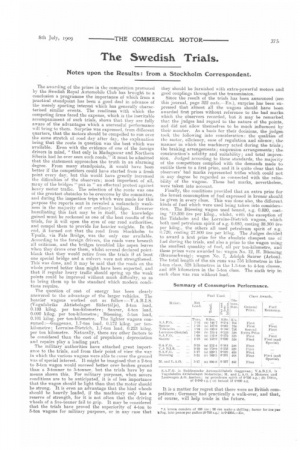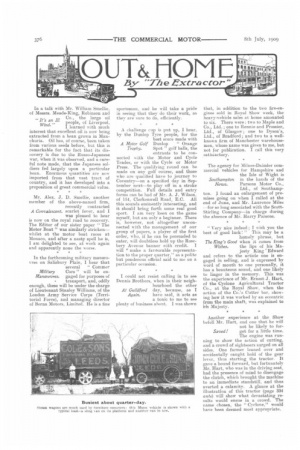The Swedish Trials.
Page 15

Page 16

If you've noticed an error in this article please click here to report it so we can fix it.
Notes upon the Results: from a Stockholm Correspondent.
The awarding of the prizes in the competition promoted by the Swedish Royal Automobile Club has brought to a conclusion a programme the importance of which from a practical standpoint has been a good deal in advance of the merely sporting interest which has generally characterised similar events. The readiness with which the competing firms faced the expense, which is the inevitable accompaniment of such trials, shows that they are fully aware of the advantages which a successful performance will bring to them. Surprise was expressed, from different quarters, that the motors should be compelled to run over the same stretch of road day after day, the explanation being that the route in question was the best which was available. Even with the evidence of one of the foreign drivers in mind, "that only in Madagascar and Northern Siberia had he ever seen such roads," it must be admitted that the statement approaches the truth in an alarming degree. From many standpoints, it would have been better if the competitors could have started from a fresh point every day, but this would have greatly increased the difficulties of the observers; most important of all, many of the bridges "put in " an effectual protest against heavy motor traffic. The selection of the route was one of the greatest obstacles to be overcome by the committee, and during the inspection trips which were made for this purpose the reports sent in revealed a melancholy weakness in the majority of our ordinary bridges. However humiliating this fact may be in itself, the knowledge gained must be reckoned as one of the best results of the trials, for it will open the eyes of our road authorities, and compel them to provide for heavier weights. In the end, it turned out that the road from Stockholm to Upsala, via Fele Bridge, was the only one available. According to the foreign drivers, the roads were beneath all criticism, and the bridges trembled like aspen leaves when they drove over them, whilst several declared pointblank that they would retire from the trials if at least one special bridge and a culvert were not strengthened. This was done, and it may be said that the roads on the whole proved better than might have been expected, and that if regular heavy traffic should spring up the weak points could be improved without much difficulty, so as to bring them up to the standard which modern conditions require.
The question of cost of energy has been clearly answered to the advantage of the larger vehicles. The heavier wagons worked out as follow :—V.A.B.I.S. (Vagnfabriks Aktiebolaget Sodertlilje), 3-ton load, 0.133 kilog. per ton-kilometre; Saurer, 4-ton load, 0.090 kilog. per ton-kilometre ; Bilessing, 5-ton load, 0.101 kilog. per ton-kilometre. The lighter wagons consumed :—Gaggenati, 1.7-ton load, 0.172 kilog. per tonkilometre ; T.orraine-Dietrich, 1.7-ton load, 0.223 kilog. per ton kilometre_ Naturally, there are other factors to be considered than the cost of propulsion; depreciation and repairs play a leading part.
The military authorities have attached great importance to the trials, and from their point of view the way in which the various wagons were able to rover the ground was of special interest. It might be imagined that a 2-ton to 3-ton wagon would succeed better over broken ground than a 3-tanner to 5-tanner, but the trials have by no means shown this. For military purposes, when severe conditions are to be anticipated, it is of less importance that the wagon should be light than that the motor should be strong. It is even an advantage that the hind wheels should be heavily loaded, if the machinery only has a reserve of strength, for it is not often that the driving wheels of a five-tonner fail to grip. It may be considered that the trials have proved the superiority of 4-ton to 5-ton wagons for military purposes, or in any case that they should be furnished with extra-powerful motors and good couplings throughout the transmission.
Since the result of the trials has been announced (sees this journal, page 322 ante.—Fe.), surprise has been expressed that almost all the wagons should have been awarded first prizes without reference to the bad marks which the observers recorded, but it may be remarked that the judges had regard to the nature of the points, and did not allow themselves to be much influenced by their number. As a basis for their decisions, the judges took the following into consideration: the qualities of the motor, efficiency, ease of regulation and silence; the manner in which the machinery acted during the trials; the braking arrangements; suspension arrangements; the construction's solidity and suitability; and total impression. Judged according to these standards, the majority of the competitors complied with the demands made to entitle them to a first prize, and it is quite clear that the observers' had marks represented trifles which could not in any degree be regarded as connected with the reliability of the wagons. These bad marks, nevertheless, were taken into account.
Finally, the conditions provided that an extra prize for' the lowest consumption of fuel expressed in kronor should be given in every class. This was done also, the different kinds of fuel which were used being taken into consideration. The Biiessing wagon used benzol, s.g. 0.830, costing *19.300 iire per kilog., whilst, with the exception of the Tidaholm and the Lorraine-Dietrich wagons, which both used petroleum spirit of s.g. 0.680, costing 38.300 ore per kilog., the others all used petroleum spirit of s.g. 0.720, costing 27.800 iire per kilog. The Judges decided to award a first prize for the absolute cheapest use of fuel during the trials, and also a prize to the wagon using the smallest quantity of fuel, all per ton-kilometre, and these prizes were awarded to: wagon Nu. 12, H. Beessing (Braunschweig); wagon No. 7, Adolph Saurer (Arbon). The total length of the six runs was 756 kilometres in the 1-ton class, 528 kilometres in the 1.5-ton to 4-ton classes, and 468 kilometres in the 5-ton class. The sixth trip irk each class was run without load.
It is a matter for regret that there were no British competitors; Germany had practically a walk-over, and that of course, will help trade in the future.
In a talk with Mr. William Smellie, of Messrs. Meade-King, Robinson and "ft san lit Co., the large oil Wind." people, of Liverpool, I learned with much
interest that excellent oil is now being extracted from a bean grown in Manchuria. Oil has, of course, been taken from various seeds before, but this is remarkable for the fact that its discovery is duo to the Russo-Japanese war, when it was observed, and a careful note made, that the Japanese soldiers fed largely upon a particular bean. Enormous quantities arenow imported from that vast tract of country, and it has developed into a proposition of great commercial value.
Mr. Alex. J. D. Smellie, another member of the above-named firm, recently contracted A Convalescent. scarlet fever, and I was pleased to hear is now on the royal road to recovery. The Editor of our sister paper " The Motor Boat" was similarly stricken— whilst at the motor boat races at Monaco, and after a nasty spell he is, I am delighted to see, at work again and apparently none the worse.
In the forthcoming military manceuvres on Salisbury Plain, I hear that several " Commer
Militaty Cars " will be enManceuvres. gaged for purposes of
• transport, and, oddly enough, these will be under the charge of Lieutenant Stanley Williams, of the London Army Service Corps (Territorial Force), and managing director of Berne Motors, Limited. He is a fine sportsman, and he will take a pride in seeing that they do their work, as they are sure to do, efficiently.
A challenge cup is put up, I hear, by the Dunlop Tyre people, for the best score made with
A Motor Golf Dunlop " Orange Trophy. Spot ' golf balls, the
entrants to be connected with the Motor and Cycle Trades, or with the Cycle or Motor Press. The qualifying round can be made on any golf course, and those who are qualified have to journey to Coventry—on a specified day in September next—to play off in a stroke competition. Full details and entry forms can be had of Mr. A. J. Wilson, of 154, Clerkenwell Road, E.C. All this sounds eminently interesting, and it should bring forth some real good sport. I am very keen on the game myself, but am only a beginner. There is, however, not altogether unconnected with the management of our group of papers, a player of the first order, who, if he can be persuaded to enter, will doubtless hold up the Rosebery Avenue banner with credit. I will " make a favourable representation to the proper quarter," as a polite but ponderous official said to me on a particular occasion.
I could not resist calling in to see Dennis Brothers, when in their neighbourhood the other At Guildford clay, because, as I Again, have said, it acts as a tonic to me to see plenty of business about. I was shown
that, in addition to the two fire-engines sold in Royal Show week, the heavy-vehicle sales at home amounted to six. There were: two to Maple and Co., Ltd.; one to Rennie and Prossier, Ltd., of Glasgow; one to Dyson's, Ltd., of Bradford; and two to a wellknown firm of Manchester warehousemen, whose name was given to me, but not for publication. I call this very satisfactory.
The agency for Milnes-Daimler commercial vehicles for Hampshire and the Isle of Wight is Southampton in the hands of the Parsons Motor Co., Ltd., of Southampton. I found an enlargement of premises going on when I called at the end of June, and Mr. Laurence Miles —for so long associated with the ScottStirling Company—in charge during the absence of Mr. Harry Parsons.
" Very nice indeed; I wish you the best of good luck: " This may be a homely phrase, but The King's Good when it comes from Wishes. the lips of his Ma jesty King 'Edward and refers to the article one is engaged in selling, and is expressed by word of mouth to one personally, it has a beauteous sound, and one likely to linger in the memory. This was the experience of Mr. Ernest J. Hart, of the Cyclone Agricultural Tractor Co., at the Royal Show, when the action of the Co.'s Cutter bar, showing how it was worked by an eccentric from the main shaft, was explained to his Majesty.
Another experience at the Show befell Mr. Hart, and one that he will not be likely to for
Saved / get for a little time.
The engine was running to show the action of cutting, and a crowd of sightseers surged on all sides. One farmer leaned over and accidentally caught hold of the gear lever, thus starting the tractor. It gave a bound forward, but fortunately Mr. Hart, who was in the driving seat., had the presence of mind to disengage the clutch, which brought the machine to an immediate standstill, and thus averted a calamity. A glance at the illustration of this tractor (page 334 ante) will show what devastating results would ensue in a crowd. The name chosen, the " Cyclone," would have been deemed most appropriate.






















